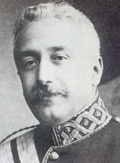 |
Niceto Alcalá-Zamora y Torres
b. 6 Jul 1877, Priego de Córdoba, Córdoba, Spain
d. 18 Feb 1949, Buenos Aires, Argentina |
| Title: |
Presidente del Gobierno Provisional de la República (President of the Provisional Government of the Republic) |
| Term: |
14 Apr 1931 - 30 Jul 1931 |
| Chronology: |
14 Apr 1931, appointed, decree of the Comité político de la República (Comité de las fuerzas políticas coaligadas para la instauración del nuevo régimen) [1][2] |
| Title: |
Presidente del Gobierno de la República Española (President of the Government of the Spanish Republic) |
| Term: |
30 Jul 1931 - 14 Oct 1931 |
| Chronology: |
30 Jul 1931, permanent status of the government approved for the period ending with the promulgation of the Constitution, resolution of the Constituent Cortes, Palacio de las Cortes, Madrid [3] |
|
14 Oct 1931, discharged following a request for resignation, decree of the President of the Government (successor) [4] |
| Title: |
Presidente de la República (President of the Republic) |
| Term: |
11 Dec 1931 - 7 Apr 1936 |
| Chronology: |
10 Dec 1931, elected, session of the Constituent Cortes, Palacio de las Cortes, Madrid [5] |
|
11 Dec 1931, took an oath of office, session of the Constituent Cortes, Palacio de las Cortes, Madrid [6] |
|
7 Apr 1936, discharged from office for violation of Art. 81 of the Constitution (illegal dissolution of the Cortes) as recognised by the resolution passed by the Congreso de los Diputados, session of the Congreso, Palacio del Congreso, Madrid [7] |
| Biography: |
| Originated from a family of humble land owners with liberal background; attended school at Cabra, Córdoba; studied law at the universities of Granada and Madrid, graduating with doctor's degree in 1899; entered civil service as junior officer of the Consejo de Estado (Council of State) in Madrid; worked as a legal representative of the French bank, Crédit Lyonnais, in Spain; was affiliated with the Partido Liberal (Liberal Party); elected to the Cortes (1905-1923), where he represented the district of La Carolina, constituency of Jaén; served as director general of the Department of Local Administration (1910) and subsecretary of the interior (1912); minister of public works (3 Nov 1917 - 22 Mar 1918), minister of war (7 Dec 1922 - 26 May 1923); member of the Disarmament Commission of the League of Nations; was one of the founders of the Derecha Liberal Republicana (Republican Liberal Movement) in Valencia (1930); one of the signatories of the Pacto de San Sebastián, a program of republican revolution (17 Aug 1930); was incarcerated after a failure of the revolt of Jaca (12 Dec 1930); after municipal elections (12 Apr 1931) which resulted in very promising electoral figures for the Republicans, was released and called for abdication of King Alfonso XIII; assumed the office of President of the Provisional Government (14 Apr 1931 - 30 Jul 1931) following the flight of the king; returned as a deputy for Jaén to the Constituent Cortes (Cortes Constituyentes), which confirmed permanent status of the Government (30 Jul 1931) for the period ending with the promulgation of the Constitution; resigned as President of the Government in protest against plans to include a provision on separation of church and state in the new Constitution (14 Oct 1931); shortly after the promulgation of the Constitution, was elected President of the Republic (served 11 Dec 1931 - 7 Apr 1936); was engaged into continuous confrontation with the right faction in the Cortes; dissolved the Cortes (7 Jan 1936) to prevent setting up a government of the right; removed from office by a vote of censure in the Cortes as he was found guilty of violating Art. 81 of the Constitution with regard to the dissolution of the Cortes (voting: 238 in favour of removal out of 417 deputies); while traveling in Scandinavia, he refused to return to Spain after the beginning of the Civil War; lived in France and moved to Argentina in 1942. |
| Biographical sources: "Alcalá-Zamora", by José Peña González (Barcelona: Editorial Ariel, 2002). |
| Elections: |
| Candidate |
Vote (10 Dec 1931) |
| Niceto Alcalá-Zamora y Torres |
362 |
| Joaquín Pi y Arsuaga |
7 |
| Julián Besteiro Fernández |
2 |
| Manuel Pedro Bartolomé Cossío |
2 |
| Miguel de Unamuno y Jugo |
1 |
| José Algoro Gorbea |
1 |
| blank |
35 |
| votes cast |
410 |
| number of voters |
466 |
|
| Source of electoral results:
Diario de sesiones de las Cortes Constituyentes de la República Española, No. 89, p. 2928. |
| |
| [1] |
Gaceta de Madrid, No. 105, 15 Apr 1931, pp. 193-194. |
| [2] |
Designated by the Comité de las fuerzas políticas coaligadas para
la instauración del nuevo régimen (also Comité de las fuerzas políticas coaligadas para la implantación de la República, triunfante en la
elección popular),
consisting of Alejandro Lerroux y García, Fernando de los Ríos Urruti, Manuel Azaña, Santiago Casares Quiroga, Miguel Maura Gamazo,
Álvaro de Albornoz y Limiñana, and Francisco Largo Caballero. |
| [3] |
Diario de sesiones de las Cortes Constituyentes de la República Española, No. 12, p. 247. |
| [4] |
Gaceta de Madrid, No. 290, 17 Oct 1931, p. 322. |
| [5] |
Diario de sesiones de las Cortes Constituyentes de la República Española, No. 89, p. 2928. |
| [6] |
Diario de sesiones de las Cortes Constituyentes de la República Española. No. 90, pp. 2931-2932. |
| [7] |
Gaceta de Madrid. Diario Oficial de la República. Miércoles 8 Abril 1936. Núm. 99. P. 227; Diario de las sesiones de Cortes, No. 15, 7 Apr 1936, pp. 268-271. |

